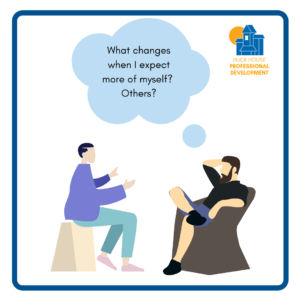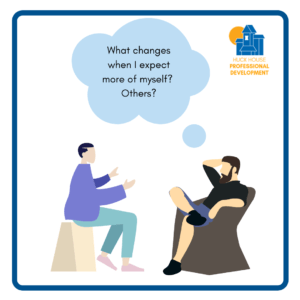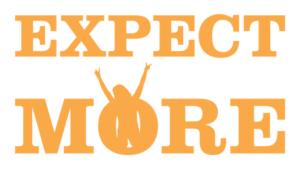Expect More.
From the Desk of Professional Development
If you’ve attended any of Huckleberry House’s trainings, advocacy, or fundraising events, you’ve probably heard this phrase before – Expect More. These two words have had a profound impact on me in my four years at Huckleberry House. I find myself asking people around me, my clients, and myself – what does expect more mean right now? In this situation? For this person?
More often than not this phrase leads to growth and change.
Expecting More of myself means –
- I don’t miss something important
- I am looking at behavior from their perspective rather than my own
- I acknowledge my own humanity and room for growth
- Growth begins with open wonder
- Being open to other’s perspectives and feedback
Examination
When we expect more – we must first examine the good, the bad, and the ugly. Within ourselves, other people, companies, non-profits, and more. We have to examine to identify our deal-breakers, values, ethics, and expectations. This examination often begins with an inventory of what is going well, followed by me imaging what I want the outcome to look like.
Acceptance
Acceptance. This is a hard one. And with expecting more comes a lot of acceptance. Acceptance of being wrong, failure, success, and being right. Acceptance of knowing what I can and cannot do – then not judging myself for my limitations or failures. Acceptance of my own responsibility and when my good intentions result in harm. Acceptance that I cannot expect more of others until I first expect more of myself – meaning acceptance of future growth and change.
Open Wonder
In trauma informed care, this is called non-judgmental curiosity. I like to call it open wonder, to remind myself the importance of taking time to imagine, explore, and reflect on what is being said to me. A great way to practice this skill is to lay in the grass, stare up at the clouds, describe the clouds, and think of as many questions as possible about clouds.
This exercise teaches us to shut off our own inner thoughts and replace them with empty space to hear other’s thoughts. It teaches us to ask questions rather than build assumptions. It teaches us to view the world from other perspectives. It teaches us to examine our own biases, perceptions, and motivations.
Why does this matter?
We are living in a world that is constantly evolving. We all have a responsibility to ensure the world we live in evolves and does so for the better. Yet, sometimes our efforts to evolve are not without unintentional harm and consequences.
As you are listening to stories you may not have heard before, practice asking yourself – what does expect more mean in this situation? To this person? And what can I do about it?
Join Us –
Click below for more information and to reserve your ticket
Cultural Humility & Ethics in Mental Health Assessments – July 10th @ 12 pm
Crisis Intervention & De-Escalation – August 14th @ Noon
Coffee & Consultation – August 18th @ 12 pm
Follow the Professional Development Team on Pinterest, Etsy, and Facebook.




